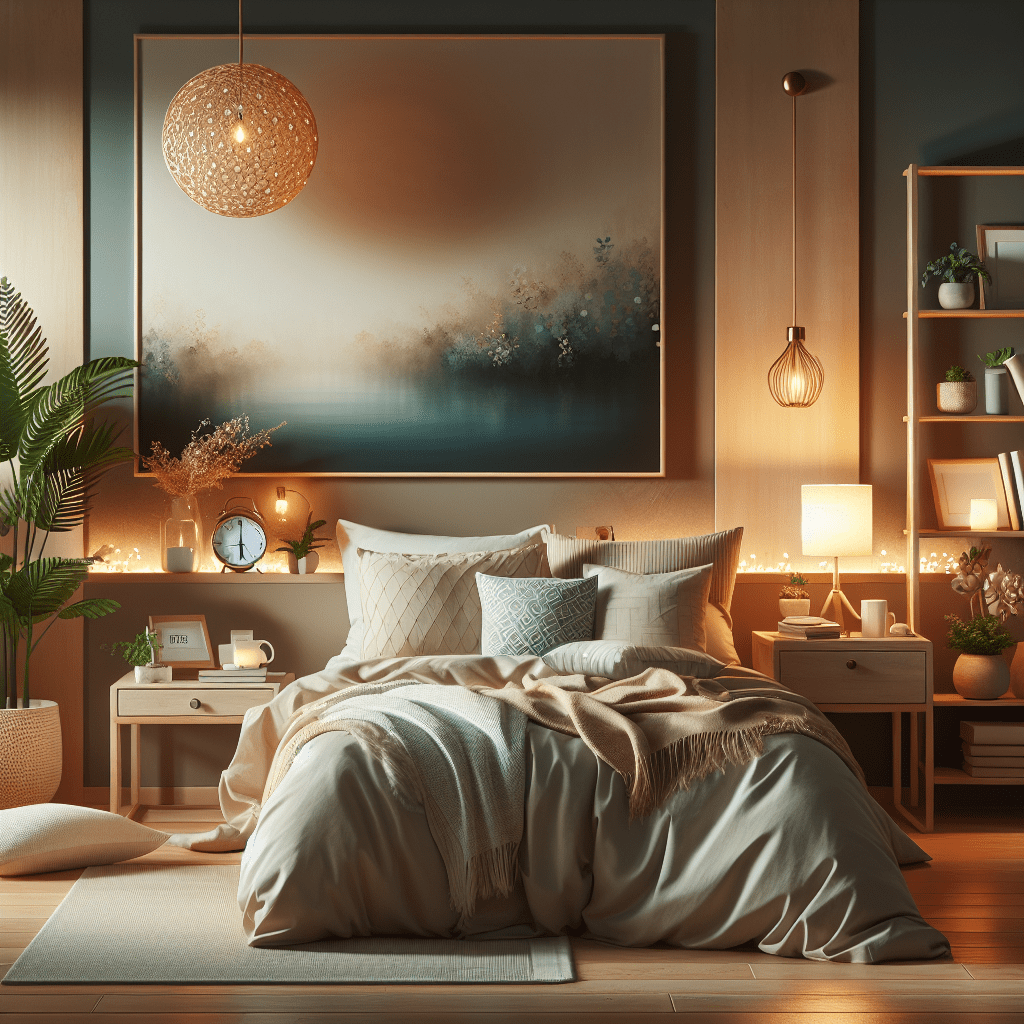Sleep Like A Pro: Practices For Optimal Rest And Rejuvenation. Everyone wants a good night’s sleep, but it’s not always easy to achieve. Luckily, there are some simple practices you can incorporate into your routine to help you sleep like a pro and wake up feeling refreshed and rejuvenated. From setting a consistent sleep schedule to creating a calming bedtime routine, these tips will have you well on your way to better sleep in no time. So, grab your favorite cozy blanket, unwind, and get ready to discover the secrets to a restful night’s sleep.
Create a Sleep-Friendly Environment
Getting a good night’s sleep is essential for our overall health and well-being. One of the key factors in achieving quality sleep is creating a sleep-friendly environment. Here are a few tips to help you set up the perfect sleep sanctuary.
Keep Your Bedroom Dark
Darkness plays a crucial role in regulating our sleep-wake cycle. When it’s time to sleep, our bodies produce melatonin, a hormone that helps us fall asleep and stay asleep. However, exposure to bright light, especially blue light emitted by electronic devices, can inhibit melatonin production and disrupt our sleep patterns.
To ensure a dark and peaceful environment, invest in blackout curtains or blinds that effectively block out external light sources like streetlights. Consider using an eye mask if you cannot darken your bedroom completely. By eliminating or minimizing light, you’ll facilitate the production of melatonin and improve your sleep quality.
Maintain a Cool Temperature
The temperature of your bedroom can significantly impact your sleep. Ideally, you want to create a cool and comfortable environment to promote restful sleep. The optimal temperature for sleep varies from person to person, but most experts recommend keeping your bedroom between 60 and 67 degrees Fahrenheit (15 to 19 degrees Celsius).
To achieve this temperature, adjust your thermostat or use fans or air conditioning to cool down the room. Keep in mind that personal preferences and factors such as bedding materials and clothing also play a role in maintaining a comfortable temperature for sleep. Experiment with different settings until you find what works best for you.
Invest in a Comfortable Mattress and Pillows
Having a comfortable and supportive mattress is crucial for a good night’s sleep. If your mattress is old, sagging, or causing discomfort, it may be time for an upgrade. Look for a mattress that suits your preferred sleep position and provides adequate support for your spine. Medium-firm mattresses are often recommended as they provide a balance of comfort and support.
Similarly, investing in the right pillows is essential for maintaining proper spinal alignment and preventing neck pain. Choose pillows that are suited to your sleep position and provide the necessary support for your head and neck. Consider factors such as pillow loft (thickness) and materials like memory foam or down alternatives.
Establish a Consistent Sleep Schedule
Maintaining a consistent sleep schedule is vital for regulating your body’s internal clock and maximizing the quality of your sleep. When you go to bed and wake up at the same time every day, your body becomes accustomed to a regular sleep pattern, allowing you to fall asleep more easily and wake up feeling refreshed.
Set a Regular Bedtime
Establishing a regular bedtime is one of the key elements in maintaining a consistent sleep schedule. Determine the ideal amount of sleep you need based on your age and individual requirements, and then work backward from your desired wake-up time. Aim to go to bed at least 7 to 9 hours before you need to wake up.
Creating a bedtime routine can help signal to your body that it’s time to wind down and prepare for sleep. Engage in relaxing activities such as reading a book, taking a warm bath, or practicing gentle stretching or yoga. Avoid stimulating activities or exposure to bright lights during this wind-down period to help your body transition into a state of relaxation.
Wake Up at the Same Time Every Day
Just as it’s important to establish a regular bedtime, waking up at the same time every day is equally crucial for maintaining a consistent sleep schedule. Consistency in wake-up times helps regulate your body’s internal clock, leading to more restorative sleep.
Even if you had a restless night or went to bed later than usual, resist the temptation to sleep in. Instead, try to get up at your regular wake-up time and avoid napping during the day to ensure you feel tired at bedtime. Over time, your body will adapt to the consistent schedule, and you’ll find it easier to fall asleep and wake up naturally without an alarm clock.

Ditch Electronics Before Bed
The presence of electronic devices in the bedroom can have a detrimental effect on your sleep quality. The blue light emitted by smartphones, tablets, computers, and televisions can suppress melatonin production and disrupt your natural sleep-wake cycle.
Avoid Electronic Devices for an Hour Before Bed
To promote better sleep, it’s best to establish a routine that includes avoiding electronic devices for at least an hour before bed. Instead of scrolling through social media or watching TV, engage in activities that promote relaxation, such as reading a book, practicing gentle yoga, or enjoying a warm cup of caffeine-free herbal tea.
By giving yourself a digital detox before bed, you’ll allow your body and mind to unwind and prepare for a restful night’s sleep. The absence of electronic stimulation will help signal to your brain that it’s time to sleep and contribute to a calmer and more restorative sleep experience.
Use Night Mode or Blue Light Filters on Devices
If completely avoiding electronic devices before bed is impractical, there are still steps you can take to mitigate their sleep-disrupting effects. Most smartphones, tablets, and computers now feature a built-in night mode or blue light filter option.
Enabling these settings shifts the color temperature of the device’s screen to warmer hues, reducing the amount of blue light emitted. This can help minimize the interference with melatonin production and make it easier for your body to prepare for sleep. Consider adjusting these settings or download third-party apps that can provide enhanced blue light filtering.
Practice Relaxation Techniques
Relaxation techniques can be incredibly effective in preparing your body and mind for sleep. By taking a few moments every night to engage in relaxation practices, you can promote calmness and tranquility, making it easier to fall asleep and stay asleep throughout the night.
Try Deep Breathing or Meditation
Deep breathing exercises and meditation can help relax your body and quiet your mind, reducing stress and anxiety before bed. Find a comfortable position in bed, close your eyes, and focus on your breath. Inhale deeply through your nose, counting to four, then exhale slowly through your mouth, also counting to four. Repeat this process for several minutes, allowing your body to relax with each breath.
Meditation offers similar benefits, allowing you to cultivate a sense of mindfulness and calm. There are various meditation techniques you can explore, including guided meditations or mindfulness apps that provide soothing audio to assist you in the process. Find what works for you and incorporate it into your nightly routine.
Listen to Calming Music or Sounds
Listening to calming music or sounds can also help create a relaxing atmosphere conducive to sleep. Soft instrumental music, nature sounds like rainfall or crashing waves, or even white noise can help drown out background distractions and promote a sense of tranquility.
Consider creating a playlist of relaxing music or using smartphone apps that offer a variety of calming sounds specifically designed for sleep. Experiment with different options and choose the melodies or sounds that resonate with you and help induce a state of relaxation.

Limit Caffeine and Alcohol Consumption
What we consume throughout the day can have a significant impact on our sleep quality. Two common culprits that can interfere with a good night’s sleep are caffeine and alcohol.
Avoid Caffeine Several Hours Before Bed
Caffeine is a stimulant that can interfere with your ability to fall asleep and stay asleep. It’s important to be mindful of your caffeine consumption, especially in the afternoon and evening. Avoid consuming caffeinated beverages like coffee, tea, or energy drinks within several hours of your expected bedtime to allow enough time for the stimulating effects to wear off.
If you’re particularly sensitive to caffeine or find that even an early afternoon cup of coffee affects your sleep, consider switching to decaffeinated alternatives or herbal teas that promote relaxation, such as chamomile or lavender.
Moderate or Avoid Alcohol Intake
While alcohol is initially sedating and may help you fall asleep faster, it can disrupt the quality and restorative nature of your sleep. Alcohol acts as a depressant, affecting the natural sleep cycles and leading to fragmented and less restful sleep.
If you choose to drink alcohol, do so in moderation and avoid drinking close to bedtime. Allow enough time for your body to metabolize the alcohol before attempting to sleep. It’s also important to note that alcohol can exacerbate snoring and sleep apnea symptoms, further compromising the quality of your sleep. Opt for non-alcoholic alternatives when possible, especially if you’re looking to improve your sleep.
Exercise Regularly
Regular exercise offers numerous benefits for both your physical and mental well-being, including improved sleep quality. Engaging in physical activity during the day can help regulate your sleep-wake cycle and promote better sleep at night.
Engage in Physical Activity During the Day
The timing and type of exercise may impact your sleep, so it’s essential to find a routine that works best for you. Aim for at least 30 minutes of moderate-intensity exercise most days of the week, but avoid intense workouts close to bedtime, as they can rev up your metabolism and make it challenging to wind down.
Outdoor activities can be especially beneficial, as exposure to natural light helps regulate your body’s internal clock. Whether it’s a brisk walk, a bike ride, or a workout class, find activities that you enjoy and incorporate them into your daily routine.
Avoid Intense Exercise Close to Bedtime
While exercise is generally beneficial for sleep, high-intensity workouts shortly before bed can have an energizing effect that may interfere with falling asleep. It’s best to complete intense workouts at least a few hours before bedtime to allow your body and mind to calm down and prepare for sleep.
If you prefer evening workouts, consider engaging in more calming and gentle exercises such as yoga, stretching, or tai chi. These activities can help promote relaxation and prepare your body for a restful night’s sleep.
Manage Stress Levels
Stress can be a significant disruptor of sleep, making it essential to find effective ways to manage stress levels and promote relaxation before bed. Implementing stress-relief techniques and creating a nighttime routine can help alleviate anxiety and set the stage for a peaceful night of sleep.
Practice Stress-Relief Techniques
There are various stress-relief techniques you can incorporate into your bedtime routine to help calm your mind and relax your body. Deep breathing exercises, meditation, or progressive muscle relaxation can all be effective tools to reduce stress and promote better sleep.
In addition to these techniques, consider keeping a journal by your bedside and spending a few minutes writing down any worries or concerns before sleep. By acknowledging and releasing these thoughts, you can prevent them from lingering in your mind and interfering with your ability to fall asleep.
Create a Nighttime Routine to Wind Down
Establishing a consistent nighttime routine can signal to your body and mind that it’s time to wind down and prepare for sleep. Your routine can include a combination of activities that promote relaxation, such as taking a warm bath, practicing gentle stretching or yoga, reading a book, or enjoying a cup of herbal tea.
Find activities that you enjoy and that help you unwind, creating a predictable and soothing routine that you can look forward to each night. Be sure to allocate enough time for these activities, allowing your body and mind to transition from the busyness of the day to a state of relaxation.
Avoid Heavy Meals Before Bed
What you eat and when you eat can greatly affect your sleep. Eating heavy meals or consuming certain types of foods close to bedtime can lead to discomfort, indigestion, and disrupted sleep.
Have a Light Dinner at Least Two Hours Before Bed
Opt for a light and balanced dinner that includes lean proteins, whole grains, and plenty of vegetables. Eating a few hours before bed allows your body enough time to digest the food and can help prevent acid reflux and indigestion that often occur when lying down.
Avoid large portions or heavy, greasy foods that are harder to digest. Instead, focus on nourishing your body with a meal that provides essential nutrients without causing discomfort that can disrupt your sleep.
Avoid Spicy or Acidic Foods that May Cause Discomfort
Certain foods, including spicy or acidic ones, can cause heartburn, indigestion, or the need for frequent trips to the bathroom during the night. To minimize discomfort and interruptions to your sleep, avoid consuming foods that are known to trigger digestive issues, especially in the evening.
Additionally, be mindful of your fluid intake before bed. Drinking too much liquid, particularly caffeinated or alcoholic beverages, can lead to frequent bathroom visits, potentially disrupting your sleep. Instead, hydrate throughout the day and taper off your fluid intake in the evening to avoid sleep disturbances.
Create a Relaxing Bedtime Routine
Creating a relaxing bedtime routine is an effective way to signal to your body and mind that it’s time to transition into sleep mode. By engaging in activities that promote relaxation, you can calm your mind and prepare for a restful night’s sleep.
Engage in Activities that Promote Relaxation
Find activities that help you unwind and promote relaxation, incorporating them into your nightly routine. Consider activities such as reading a book (preferably something non-stimulating), practicing gentle stretching or yoga, taking a warm bath, or engaging in a soothing skincare routine.
Experiment with different activities and combinations to discover what works best for you. The key is to choose activities that allow you to disconnect from the demands of the day and create a peaceful atmosphere that supports restful sleep.
Avoid Stimulating Activities Like Work or Screen Time
As you wind down for the evening, it’s essential to steer clear of stimulating activities that can keep your mind alert and make it challenging to fall asleep. Engaging in work-related tasks, checking emails, or engaging in intense discussions right before bed can heighten your stress levels and hinder your ability to relax.
Likewise, avoid screen time, especially exposure to bright lights from electronic devices, at least an hour before bed. The blue light emitted by these devices can suppress melatonin production and interfere with your sleep-wake cycle. Instead, choose calming activities that encourage relaxation and prepare your mind and body for a peaceful night’s sleep.
Consider Natural Sleep Aids
In addition to implementing healthy sleep practices, you may find natural sleep aids helpful in promoting relaxation and improving sleep quality. While these aids are not a substitute for healthy sleep habits, they can complement your efforts to create an optimal sleep environment.
Try Herbal teas like Chamomile or Valerian Root
Herbal teas have been used for centuries to promote relaxation and help facilitate sleep. Chamomile and valerian root teas are well-known for their calming properties and are often recommended as natural sleep aids.
Brew a cup of chamomile or valerian root tea about an hour before bed and sip it slowly. The warmth and soothing aroma will help you unwind while the natural properties of these herbs can help relax your body and induce sleepiness.
Use Essential Oils like Lavender for Aromatherapy
Aromatherapy with essential oils is another popular method for promoting relaxation and better sleep. Lavender, in particular, is renowned for its soothing properties and ability to promote restful sleep.
Create a calming atmosphere in your bedroom by using a diffuser or spray lavender essential oil on your pillow or bedding before sleep. The gentle fragrance of lavender will help create a serene environment and potentially reduce anxiety or stress that might be interfering with your sleep.
Remember to always use essential oils safely and follow proper dilution instructions. If you have any specific health conditions or concerns, consult with a qualified aromatherapist or healthcare professional before incorporating essential oils into your sleep routine.
Conclusion Sleep Like A Pro: Practices For Optimal Rest And Rejuvenation
In conclusion, sleep is an essential aspect of our overall well-being, and creating a sleep-friendly environment and implementing healthy sleep practices are key to achieving optimal rest and rejuvenation. By following these tips, you can improve the quality of your sleep and wake up feeling refreshed, energized, and ready to conquer the day ahead. So, here’s to a good night’s sleep and a better tomorrow! Sleep tight!
